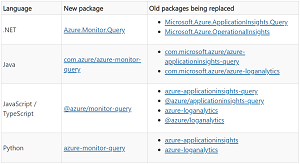News
New in Azure SDK: Data Tables & Monitor Libraries, and More
New Azure Data Tables libraries and beta Azure Monitor libraries highlight the latest update to the Azure SDK.
As part of the June 2021 release, Microsoft announced seven Stable updates and 18 previews. The dev team called out new Azure Data Tables libraries -- targeting .NET, Java, JavaScript/TypeScript and Python -- in a separate post. Azure Table storage is a service that stores structured NoSQL data in the cloud, providing a key/attribute store with a schemaless design, according to its documentation.
"The Table storage service can be used to store flexible data sets like user data for web applications, address books, device information, or other types of metadata," Microsoft said. "The new libraries follow our Azure SDK Guidelines, making for an idiomatic, consistent, approachable, diagnosable, and dependable library. The new libraries use the language-specific Azure Core packages for handling requests, errors, and credentials."
The new Azure Monitor libraries announced in a v1.0 Beta 1 release, meanwhile, are used to query Logs and Metrics. Formerly, libraries for those two queries came in separate packages, now combined into one.
 [Click on image for larger view.] Unified Client Library (source: Microsoft).
[Click on image for larger view.] Unified Client Library (source: Microsoft).
Along with that unification, new features include:
- Batch API for Logs query: Multiple Logs queries can be executed in a single request.
- Performance statistics: Developers can opt in to include Logs query performance statistics -- including execution time and resource usage -- in a response.
- Server timeout: The default used to be three minutes but some Logs queries take longer than that, so the new libraries let developers increase the timeout up to 10 minutes.
- Handwritten client libraries: These replace the code-generation scheme that was used for the old libraries (except for the .NET library). The new libraries for Java, JavaScript/TypeScript and Python are now handwritten for parity with .NET. "Per the design principles for the new Azure SDK libraries, the libraries strive to be idiomatic," Microsoft said. "As a developer in the target language, interacting with the library should feel natural."
- Azure Active Directory authentication: This is supported for both Logs and Metrics queries, via Azure Identity. This is said to improves the local development experience in editors and IDEs such as IntelliJ, Visual Studio Code and Visual Studio.
About the Author
David Ramel is an editor and writer at Converge 360.